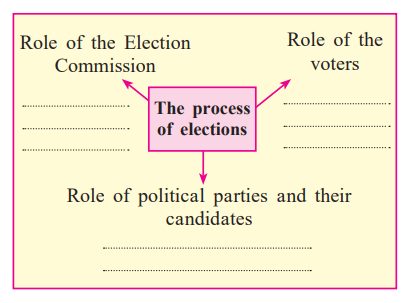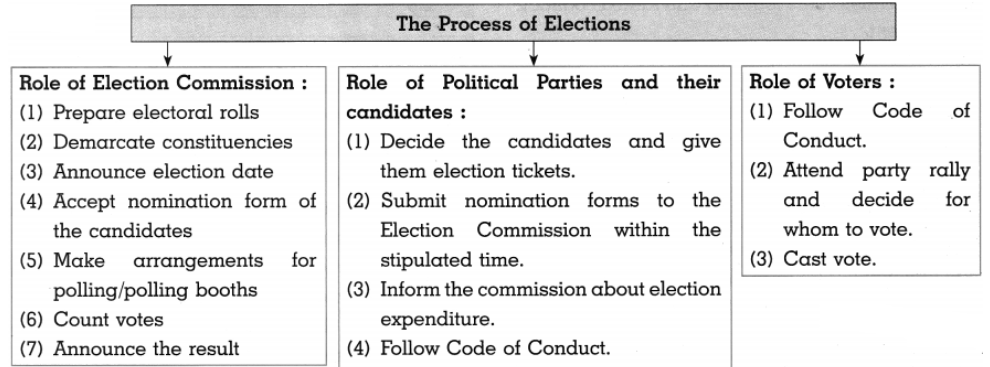EXERCISE
Question 1.
Choose the correct option from the given options and complete the sentences.
(1) The Election Commissioner is appointed by the …………………………. .
(a) President
(b) Prime Minister
(c) Speaker of Loksabha
(d) Vice President
Answer:
(a) President
(2) …………………………. was appointed as the first Chief Election Commissioner of independent India.
(a) Dr. Rajendra Prasad
(b) T.N. Sheshan
(c) Sukumar Sen
(d) Neela Satyanarayan
Answer:
(c) Sukumar Sen
(3) Constituencies are created by …………………………. committee of the Election Commission.
(a) Selection
(b) Delimitation
(c) Voting
(d) Timetable
Answer:
(b) Delimitation
Question 2.
State whether the following statements are true or false. Give reasons for your answer.
(1) The Elections Commission lays down the code of conduct during elections.
Answer:
The above statement is True. Reasons:
It ensures free and fair elections.
Maipractices during the election come under control.
Due to the strict observance of the code of conduct in the last few’ elections, the common voters have become confident.
(2) Under special circumstances the Election Commission holds re-elections in a particular constituency for a second time.
Answer:
The above statement is True. Reasons :
Sometimes, the representative of Lok Sabha, Vidhan Sabha or the local self governmènt resigns from his/her constituençy.
In some cases, death of the representative occurs.
In such special situations, the Election Commission has to conduct an election for a second time. It is called By-elections.
(3) The state government decides as to when and in how many stages the elections would be held in a particular State.
Answer:
The above statement is False. Reasons :
- The entire process of conducting elections is entrusted upon and managed by the Election Commission.
- If this responsibility is given to the state government it may adopt a biased approach.
- Hence, the Constitution has formed the Election Commission an independent body to carry out the responsibility.
Therefore, it is decided by the Election Commission as to when and in how many stages it will conduct elections.
Question 3.
Explain the concept.
(1) Reorganising the constituencies
Answer:
(1) The Election Commission of India formed constituencies for Lok Sabha and Legislative Assembly.
(2) The Election Commission had decided upon the constituencies before the first election. As the years passed, there was a lot of migration of the people for business and other activities from the villages to cities.
(3) This changed the demography to large extent. Number of voters in some constituencies reduced while in some it increased to a very great extent. This disturbed the ratio of- seats allotted as compared to population in those constituencies.
(4) Hence, the need to readjust the constituencies arose. The Delimitation Commission of the election commission does the work of reorganising or restructuring of constituencies.
(2) Midterm Elections
Midterm elections occur when the elected government loses its majority in Parliament or a state legislature before completing its full term, usually five years. This can happen if coalition partners withdraw support or if the government faces a no-confidence motion, and no alternative government can be formed. As a result, fresh elections are held to elect a new government for the remaining term.
Question 4.
Complete the following picture.
Question 5.
Answer in brief.
(1) Explain the functions of the Election Commission.
Answer:
The functions of the Election Commissipn are:
(1) Prepare the voters’ list.
(2) Decide election timetable and decide the entire process of holding elections.
(3) Scrutinize the applications of the candidates.
(4) Conduct free and fair elections and do all the work related to it.
(5) Give recognition and also de-recognize political parties.
(6) Resolve all the disputes and complaints regarding elections.
(2) Write some additional information about post of the Election Commissioner.
Answer:
(1) The Election Commission in India has one Chief Election Commissioner and two other Chief Commissioners.
(2) All the commissioners are appointed by the President.
(3) The Chief Election Commissioner of India is usually a member of the Indian Civil Service or. Indian Administrative Service.
(4) The responsibility of conducting free and fair elections to the Parliament and State Legislatures lies with the Election Commissioner.
(5) In order do safeguard the independence of the Election Commissioner, he cannot be easily removed from the post for any political reasons.
(3) Explain the meaning of Code of Conduct.
Answer:
(1) After the announcement of elections till the declaration of results, the Election Commission enforces the Code of Conduct.
(2) It explains the rules to be followed by the government, political parties candidates and voters before and during elections.
(3) Code of conduct is adopted to control malpractices during elections. It ensure free and fair ecections.



Leave a Reply